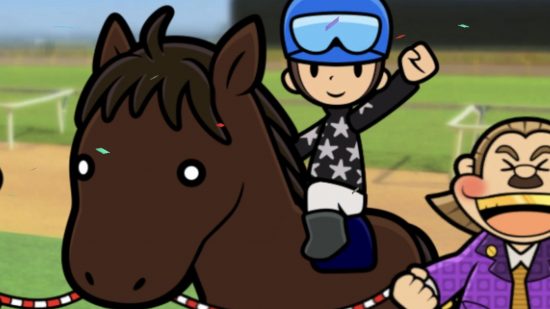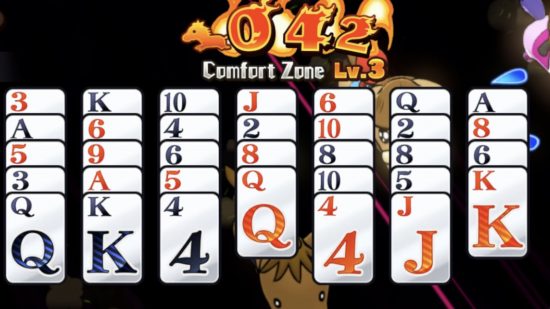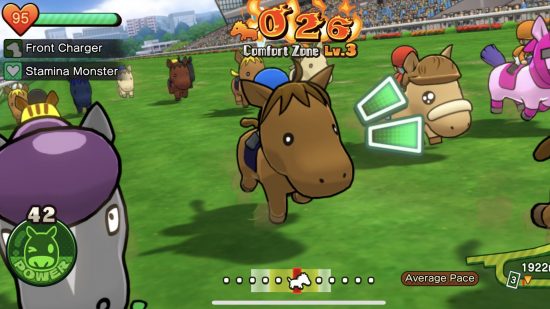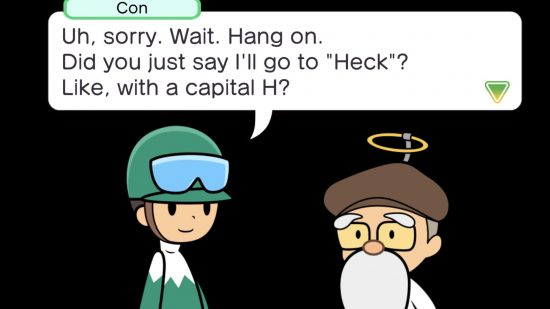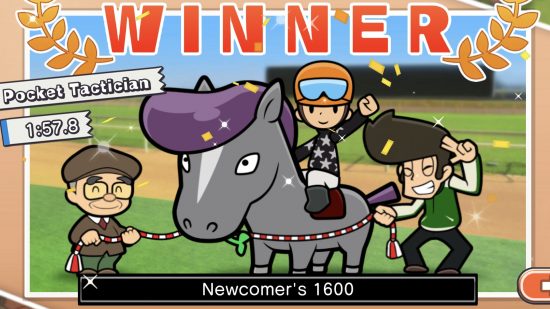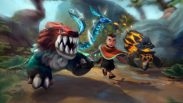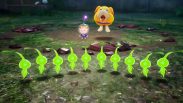Pocket Card Jokey: Ride On! is a strange game. Part horse racing, part solitaire, and part animal breeding, it’s an amalgamation of things I would usually find incredibly mundane. Like seriously mundane. Like plain toast without butter. Still, somehow, you put these three things together, add some quirky characters, get those mechanics tighter than Secretariat’s saddle, and you’ve got a game I just can’t put down.
For context, the original version of this title arrived on Nintendo 3DS in 2013, courtesy of iconic Pokémon developer Game Freak, and has long been something of a cult icon among Nintendo fanatics. Still, with the 3DS lurching towards obscurity, it looked as if Pocket Card Jockey could have been a thing of the past before too long, but now, with the title available on Apple Arcade, a whole new generation can enjoy the thrill of solitaire horse racing. No, really, there is a thrill, I promise.
The basic premise in Ride On is simple, you rent a horse from an established owner, you race that horse by completing two-to-five rounds of solitaire that equate to a racing course, and once that horse reaches three losses at full maturity, you retire it and ride a new one. Horses aren’t retired forever though, not in any ghoulish tarpaulin-on-the-track way with the loud crack of a gunshot, they go to this game’s equivalent of the Pokémon daycare centre where they can be paired with mates to produce a new filly wunderkind.
The execution of Ride On is less straightforward, but that doesn’t mean it’s necessarily complex, there’s a distinction there. You need to get a few mechanics through your head before you really feel like you have a chance in races. Each starts with a tableau of cards for a quick game of solitaire, but it’s really quick at the start, with you finding a path from the bottom line to the top as soon as possible to get out of the gates in a good position. To complicate things further, the card you draw here designates your starting area in the race, with three levels of Solitaire difficulty throughout the pack of horses.
Each level of difficulty makes the difference to the other big mechanics at play during a race, energy and stamina. Stamina is determined by where you race and how much effort you exert, with the inside of the track the safest place to be, while energy is determined by how much of each solitaire tableau you can clear. If you’re in fine fettle and can clear all the cards, then your horse is in a good mood, saving stamina and racing alongside the best, but if you mess up the order of cards and can’t clear them all, your horse gets mad.
If you really mess up, I mean really pull a solitaire stinker with 4s, 7s, and queens left all over the board, your horse might just fully lose the plot, stampeding to the final part of the race where it loses all its energy as every other horse passes you by. It’s frustrating, but it’s annoyingly fair, you know where you messed up when you mess up, and the game isn’t going to hold your hand and let you look at the pretty ponies from afar.
For those who do need some assistance, there’s an in-game shop where you can buy special items like stamina carrots, helping your horse go for longer, as well as solitaire power-ups like the ability to see all useable cards on the tableau or a luck increase that sees the cards you pull from the deck more likely to line up with those on the board. Still, the shop isn’t always available, and while that can be a tad upsetting if you’re heading into a big race, it does mean that you can’t rely on the special items and at some point, you need to learn how to race as the game intends.
There’s a fittingly strange narrative at the heart of Ride On too, or at least a semi-narrative, something to get things started. You begin the game as a fledgling jockey dreaming of winning the big derby, before a horse kicks and kills you. In the afterlife, you meet an equestrian enthusiast who agrees to grant you life if you can return to win the big prize, and with a zap, you’re back to the land of the living and picking your first racing partner.
From here, the story falls to the wayside, but not the witty dialogue and banter between characters, that stays throughout, with even more zip than in the original. I didn’t skip much dialogue, and considering I’m the type to hammer A all the way through a Pokémon story, that’s a sign this game must be doing something right.
Well, that was a lot of explaining without many opinions – I told you there was a lot going on here – but let me be clear in saying that once all of this is in your head, it’s hard to get anything else up there. The weekend I took to review Ride On, I had other things to do, plenty of other things, but this kind of devolved into countless instances of “one more race” that ate at my time like a starving stallion munching on a never-ending carrot.
Simply put, the mechanics are fun, the races feel fair, and the jump between difficulty for events – from G3, the easiest, through to G1, those you rarely win without a rare breed of horse or a bit of good luck – keeps things interesting.
Outside of the racing and solitaire, breeding becomes more important the more horses you pick up, with the possiblity of breeding your own Red Rum level racer. The horses you breed tend to be better than the loaner options, and each parent has a card assigned for a special poker minigame that begins just after the birth of your new horse, with anything from a two-pair to a full house powering up your future racing partner. The breeding isn’t Pokémon-level deep, but Ride On benefits from that, and any extra complications would feel unnecessary.
Admittedly, retirement takes a bit of getting used to. The first couple of times the game yanks a horse that you’re just getting attached to away just because it came in a close second on a race it never would have won, it’s really quite gutting, but you come to learn that this is the way of Ride On, and in retirement, your old horses can breed a new generation of thoroughbreds, using the experience from the parents’ career to pass abilities on.
It’s all part of the way of things, and having to use new horses means you meet new horse owners, with each of the illustrious and wealthy animal lenders having a certain something, be it warmth or wackiness, about them. Considering it’s a game about horses, some of the human characters add a warmth that makes you even less likely to put the game down, and the sarcastic exchanges do go a way to ease your nerves before a big race, or cool you down after just losing one.
The last thing worth mentioning in terms of the core gameplay is that you’re going to lose. Oh boy, are you going to lose. This isn’t the Game Freak of Pokémon where you beat every opponent easily before stampeding over the best in the land, in Ride On, you’re going to lose more races than you win, especially in your first few hours, and this is perfectly fine. Like I said earlier, you rarely feel cheated, either the horses in the field are better than you are or you mess it up yourself by using too much stamina or by failing to finish a tableau
Visually, Pocket Card Jockey: Ride On is something of a surprise treat, with some serious upscaling compared to the 3DS version. Also, the horses are cute. Super cute. Some of them even have quiffs! There are no problems with performance either, with each race and solitaire tableu section as smooth as you could ask for. It’s just a pleasure to play (except when you can’t find the cards you need, but hey, that’s all part of the process).
All-in-all, Pocket Card Jockey: Ride On takes everything so great about the original experience and makes it that bit easier to understand and that bit more fun to play. It takes a while to adjust to all the mechanics, but once you do, you’ll be struggling to put it down. So ride on jockey, ride on!
Pocket Card Jockey: Ride On review
Pocket Card Jockey: Ride On is the best card game on Apple Arcade, the best sports game on Apple Arcade, and, well, it might just be the best game on Apple Arcade. With exhilarating mechanics, hours of content, and idiosyncrasy like no other sports or card game, there’s no reason not to try your luck with the ponies.
